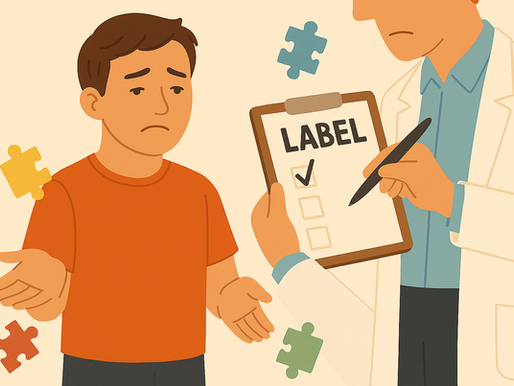top of page
Search
![The 5th edition, published in 2013, set out to simplify and modernise the nosology of autism-related disorders, replacing the DSM-IV’s cluster of Pervasive Developmental Disorders (PDDs) — Autistic Disorder, Asperger’s Disorder, Childhood Disintegrative Disorder, Rett’s Disorder[1] and PDD-Not Otherwise Specified (PDD-NOS) — with a single diagnosis: Autism Spectrum Disorder (ASD). The intent was, in principle, laudable: a spectrum captures gradation and avoids splits between “high-” and “low-functioning” labels. In practice, DSM-5 produced a conceptual flattening by collapsing important distinctions and introduced criteria so under-specified they undermine diagnostic coherence – creating a set of internal contradictions that have done more to muddy than to clarify diagnosis.](https://static.wixstatic.com/media/904f97_7ed4d390f69f44a3bee34406e457dba0~mv2.png/v1/fill/w_333,h_250,fp_0.50_0.50,q_35,blur_30,enc_avif,quality_auto/904f97_7ed4d390f69f44a3bee34406e457dba0~mv2.webp)
![The 5th edition, published in 2013, set out to simplify and modernise the nosology of autism-related disorders, replacing the DSM-IV’s cluster of Pervasive Developmental Disorders (PDDs) — Autistic Disorder, Asperger’s Disorder, Childhood Disintegrative Disorder, Rett’s Disorder[1] and PDD-Not Otherwise Specified (PDD-NOS) — with a single diagnosis: Autism Spectrum Disorder (ASD). The intent was, in principle, laudable: a spectrum captures gradation and avoids splits between “high-” and “low-functioning” labels. In practice, DSM-5 produced a conceptual flattening by collapsing important distinctions and introduced criteria so under-specified they undermine diagnostic coherence – creating a set of internal contradictions that have done more to muddy than to clarify diagnosis.](https://static.wixstatic.com/media/904f97_7ed4d390f69f44a3bee34406e457dba0~mv2.png/v1/fill/w_514,h_386,fp_0.50_0.50,q_95,enc_avif,quality_auto/904f97_7ed4d390f69f44a3bee34406e457dba0~mv2.webp)
When a Spectrum Becomes a Vacuum: How DSM-5 Broke Autism Diagnosis and Fed a Diagnostic Epidemic
A Simplification That Simplifies Nothing The 5 th edition, published in 2013, set out to simplify and modernise the nosology of autism-related disorders, replacing the DSM-IV’s cluster of Pervasive Developmental Disorders (PDDs) — Autistic Disorder, Asperger’s Disorder, Childhood Disintegrative Disorder, Rett’s Disorder [ 1 ] and PDD-Not Otherwise Specified (PDD-NOS) — with a single diagnosis: Autism Spectrum Disorder (ASD). The intent was, in principle, laudable: a spectrum
Nov 23, 20258 min read


Diagnostic Stability of Autism Before the Concept of Spectrum
The question of how stable an autism diagnosis is over time has long been debated. While many families and clinicians view an autism diagnosis as lifelong, research suggests that diagnostic stability—how consistently a diagnosis persists over time—depends heavily on which diagnostic framework is used. Emerging evidence indicates that before the introduction of the broader ASD category in the DSM-5 (APA 2013), autism diagnoses were more stable and predictable. Before DSM-5: D
Nov 7, 20253 min read


In Memory of Donna Williams (1963-2017)
12 October 2025 would have been Donna Williams’ 62 nd birthday — a day to remember not only an extraordinary woman but also a mind...
Oct 13, 20253 min read


Autism Diagnosis Today (2): Dediagnosing
In the past two decades, our societies have become more fluent in the language of mental health. Public campaigns encourage people to...
Sep 5, 20255 min read


The Prevalence Inflation Hypothesis and Autism Overdiagnosis
Over the past decade, mental health awareness campaigns have expanded significantly across the Western world. These efforts, ranging from...
Aug 28, 20255 min read


Autism Diagnosis Today (1): Overdiagnosis
Autism has undergone a remarkable transformation in recent decades. Once thought of as a rare and narrowly defined childhood condition,...
Aug 20, 20255 min read


Regression in Autism (3):
In most cases, ASD is diagnosed between 15 and 30 months. Some children exhibit typical early development, only to lose acquired language and social skills between 15 and 30 months. These cases qualify as regressive autism.
However, there are instances of late onset autism where individuals appear to develop typically until adolescence or even adulthood before displaying symptoms consistent with autism. In such cases, an identifiable neurological insult, such as, e.g, herpes
Jul 10, 20257 min read


Regression in Autism (2):
Regression in autism, often seen within the first two years of life, represents a distinct subtype of autism that has sparked considerable scientific interest. While the exact causes of regression are still not fully understood, current research points to a combination of genetic, environmental, metabolic, immune, and neurological factors.
Jul 4, 20255 min read


Regression in Autism (1):
Complex developmental path s Regression in autism refers to the loss of previously acquired developmental skills—such as spoken...
Jun 29, 20255 min read


From Puzzle Pieces to Infinity:
It’s easy to get caught up in the search for new symbols, new slogans, new ways to “reframe” autism. But the risk is that these abstract concepts become so polished, so removed from the daily lived reality of many autistic individuals, that they stop representing them at all.
Not everything has to be shiny or new. Not everything has to be metaphorical or aspirational. Sometimes, the most powerful way to accept autism is not through symbols—but through sustained, patient, and
Jun 14, 20253 min read


Development of Theory of Mind in Autism
Theory of Mind (ToM) is a critical aspect of social cognition and undergoes significant developmental changes from infancy to adulthood....
Mar 15, 20252 min read


Theory of Mind: Evolution of Terminology and Conceptualisation
Theory of Mind (ToM) refers to the ability to attribute mental states—such as beliefs, intentions, and emotions—to oneself and others,...
Feb 25, 20252 min read


Alexithymia and Autism (2): The complex interplay
Alexithymia is considered a “sub-clinical phenomenon” (Silani et al. 2008) and doesn’t identify a personality disorder per se but is a personality trait that is dimensional in nature (Taylor et al. 1991). Alexithymia is not a symptom of autism, but rather an independent construct that frequently co-occurs with autism. Although alexithymia has similar symptoms , it is distinct from autism – it is neither a necessary nor sufficient feature for an autism diagnosis, and there a
Nov 28, 20245 min read


Alexithymia and Autism (1): Intersections of two distinct conditions
The connection between alexithymia and ASD was initially explored in the 1990s through clinical studies on individuals with eating disorders, specifically anorexia nervosa (AN). The studies revealed the co-occurrence of eating disorders with deficiencies in social competence and identified some traits that were considered typical of ASD, [ 1 ] such as empathy problems, as well as some features considered typical of alexithymia, such as difficulty verbalising emotions, ide
Nov 24, 20244 min read


Chronic Pain in Autism (2):
The Diagnostic Difficulties Chronic pain is quite common in autism , yet it is often unrecognised (and undiagnosed). The diagnosis of...
Aug 15, 20245 min read


One of the Myths About Autism:
‘Autistic people don’t do metaphors’ Because of their literal interpretation, autistic children do experience difficulties in...
Jul 19, 20245 min read


Narcissistic Personality Disorder and Autism (1):
Overlapping symptoms and differences Narcissistic Personality Disorder (NPD) and ASD are two distinct condition. However, they share...
Mar 21, 20246 min read


Autism and Dementia: (1) Prevalence
- Hello, where are you? - I am at home. - At home? Where? - I have one home, in England. Why? What’s happened? - Why did you leave without saying ‘goodbye’? It was great when you and your daughter came to see me. We visited friends and had fun. I was preparing your farewell party, but you left. You could have said goodbye… Thus began my conversation with my childhood friend (B.). We have be
Mar 18, 20234 min read


Hypersensitivities (often misinterpreted as ESP) and other phenomena in autism
Sometimes sensory hypersensitivities are misinterpreted as extrasensory perception (ESP) as ‘normal’ people not only fail to see, hear,...
Nov 25, 20223 min read


Autism: Sensations last too long
A painful truth Sensory stimuli can be experienced very differently by autistic individuals. Just because we may not feel something, it...
Nov 4, 20224 min read
bottom of page
.jpg)